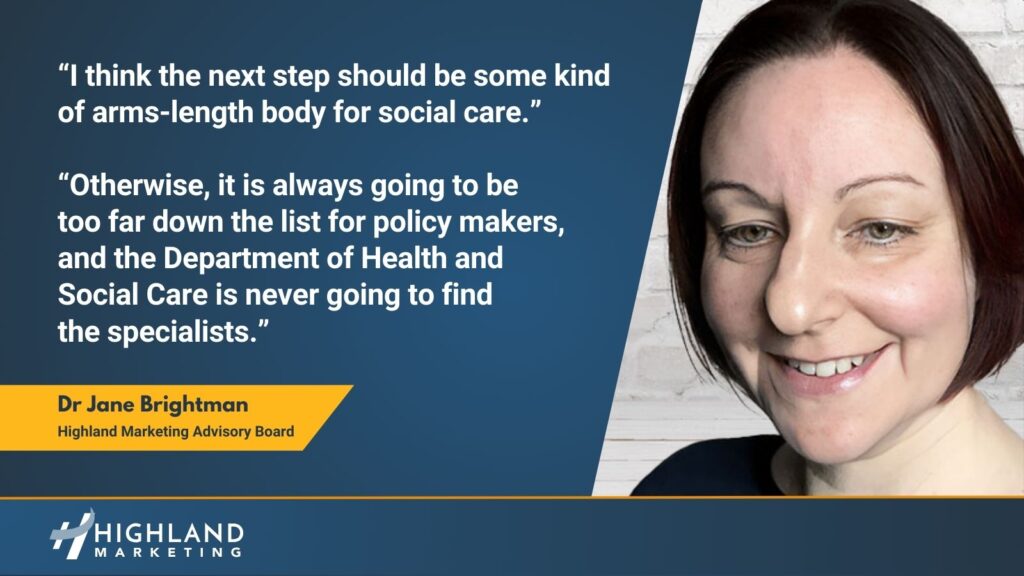Workforce and digital expert Dr Jane Brightman has joined the Highland Marketing advisory board to bring a strong voice for social care to its discussions. Here, she outlines some of the challenges and progress the sector has faced since the Covid-19 pandemic, and what should come next in the digital space.
When Highland Marketing last interviewed Dr Jane Brightman, in February 2021, the Covid-19 pandemic had been underway for a year. But with the second wave abating, there was considerable optimism about the future of the NHS and social care – and care tech was having a moment.
Briefly, it looked as though the pandemic had proved the case for moving away from paper notes and implementing digital and shared care records, and there was genuine enthusiasm for software and apps to enable remote working and near-home care.
It even looked as though policy and funding might be aligning to keep up momentum, as integrated care systems came on stream and that year’s Budget found additional money for recovery and innovative technology. Three-years on though, some of that optimism has dissipated.
NHS management has become distracted by the endless re-organisation of arms-length bodies, while hospitals are struggling with waiting lists, a looming financial crisis and strikes, and primary care is bearing the brunt of growing public anger.
A worsening crisis in social care
Even so, things are worse in social care, where demand is bankrupting councils (The Guardian), inflation is putting pressure on providers, and vacancy rates have reached 150,000 and counting (Community Care). On the rare occasions when the social care crisis attracts political and press attention, the focus tends to be on how it impacts hospital discharges.
Yet, Dr Brightman points out, the bigger issue is that many potential users can no longer access the care they need: whether that is help with the basics of daily living or rehabilitation. “The focus tends to be on hospitals and discharge, and we overlook what happens in the community,” she says, “but that can be crucial.
“Some think-tanks and integrated care boards are starting to get interested in this. The Institute for Public Policy Research has estimated that long-term sickness is costing the UK economy £43 billion a year (Bloomberg). As a society, we are ageing, and we need to start ageing better.”
Ageing better
Dr Brightman started her career with the UK’s largest not for profit care provider, the Anchor Trust, and soon developed an interest in training and technology. She was director of a private training provider before moving to Skills for Care in 2016, where she worked on national workforce initiatives, qualifications, and learning.
In February 2021, she had just taken up a new role at the Institute for Health and Social Care Management, from where she moved on to NHS England as assistant director of programmes, working on system reform and the digitising social care programme.
After two years at NHS England, she has returned to Skills for Care, to work on a workforce strategy for the sector that, she argues, is essential – and not just to tackle that vacancy rate. “We need the workforce strategy to identify the adult social care workforce needs over the next 15 years and set out a plan for ensuring the sector has enough of the right people with the right skills. It will help employers and commissioners with workforce planning, support the government’s reform agenda and complement the NHS Long Term Workforce Plan,” she says.
“We don’t have enough people now, and that ageing population both increases demand and reduces the number of people available to meet it. So, it’s a perfect storm and we need to think creatively about how to respond to it.”
Supporting the workforce
One of the things that the Covid-19 pandemic demonstrated to the public is that the social care workforce can respond.
“When I started out in social care, the people we supported were people who were getting frail,” Dr Brightman reflects. “They maybe hadn’t been well, they’d had an accident, they might have some signs of dementia, but basically we went in to cook and clean and support with some personal care.
“Now, social care is supporting people with complex conditions and very severe dementia. The workforce is absolutely up for doing it, but it’s not given the professional recognition, or the skills, or the technology to do it. Or the pay. So that’s what we need to address.”
Digital progress
On the IT front, at least, progress is being made. In the NHS, a lot of recovery and technology funding has been ‘clawed back’ or channelled into the Frontline Digitisation programme to complete the decades-long ambition to get electronic patient records into hospitals.
But in social care, the Digitising Social Care programme has managed to hang onto most of its money and is rolling out digital social care records to care providers. In fact, it should hit a revised target for 70% of providers to have a record in place in March.
NHS England has created an assured list of solutions that meet key requirements on issues like cyber security and data collection, and Dr Brightman says this should drive up standards by encouraging providers to invest in some of the “great systems” that have been developed.
Despite the cutbacks elsewhere, NHS England has maintained its shared care record programme, which is a key enabler for sharing information between health, social care, and the third-sector (although there is a question mark over how it will be funded past the end of the coming financial year).
And in October, the government found £3 million to expand the Adult Social Care Technology Fund, which is piloting ideas to improve quality of life, prevent falls, and spot deterioration. “These are significant pilots that are looking for evidence of benefit,” Dr Brightman says.
“They are asking important questions: such as does it work, and if it does, who benefits? Is it the NHS, or a care provider, or the individual. If we know that, we can start to work out who should pay for the investment required.”
Tech challenges remain
Even so, there is plenty still to do. Dr Brightman picks out three areas for attention. One is keeping an eye on the basics, such as cyber-security. “The Advanced outage [the 2022 cyber-attack that took down some of the company’s systems for weeks] hit social care very hard,” she says.
“People who were using Advanced to record their activity couldn’t prove what they had done, so they couldn’t get paid. And we need to remember that social care systems hold really, really sensitive data – right down to key codes that give access to people’s homes – so it’s important to make sure they’re safe.”
Another item on her “wish list” would be a staff passport, to improve security. “A passport would help with identity management and support the kind of role-based access that is being introduced for shared care records,” she says.
“But it would also help people to move around the system. Around a third of the workforce moves every year, and each time they start with a new provider, they have to repeat their basic checks and training and it costs millions and millions of pounds. Just stopping that would address a lot of productivity and efficiency issues.”

Raising the profile of social care and getting policy, staff and digital aligned
A third area is improving digital leadership and skills. At the moment, only a few, large providers have digital, data and technology professionals in place, and there is no equivalent of the chief clinical information officer in social care, to provide a bridge between technology and the people who use it.
Developing “confident, digital leadership” for the sector will be just one of the issues that Skills for Care will look at as it develops a workforce strategy for the sector. “I think the workforce strategy is a big positive, and not just because I am involved in it,” Dr Brightman says.
“It’s exciting, because it’s engaging senior leaders, and it’s aligning with the NHS workforce strategy, and there’s a big opportunity to work out where digital fits.”
In the longer-term, though, Dr Brightman believes the real challenge is to make sure that social care gets its due: that it’s not just tagged onto the NHS as ‘health and care.’ Scotland is setting up a National Care Service to boost the sector, reduce variation, and improve efficiency.
This feels like too much of an ask in England’s more fragmented and more privatised landscape. Yet, Dr Brightman points out, social care already has a national regulator, a workforce body, and qualifications, so an over-arching arms-length body might be achievable.
“I think the next step should be some kind of arms-length body for social care,” she argues. “Otherwise, it is always going to be too far down the list for policy makers, and the Department of Health and Social Care is never going to find the specialists.”
If social care got its ALB, she adds, it could also develop an NHSX-style arm to pull together the many different strands of digital, from cyber security to skills and from system roll-out to innovation. “I know that NHSX was merged back into NHS England but for social care it was fabulous,” she says. “It’s that model that is needed. It wouldn’t be easy, but I really believe it could be done.”


